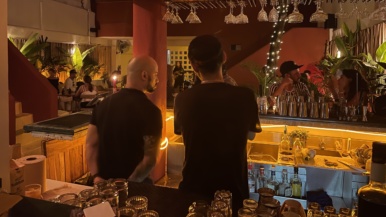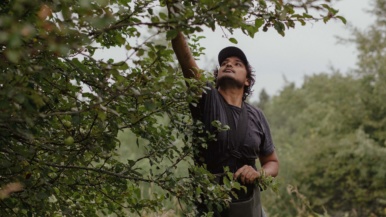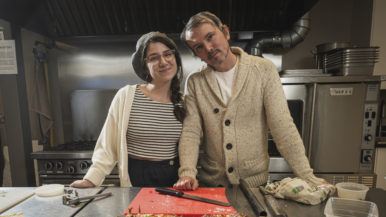I adopted a stateless child, but I’m not allowed to bring her home
I’ve had to figure out how to be a long-distance parent

In 2005, I started a humanitarian program in the Dominican Republic with my husband at the time, Vaden. We ran it out of our non-profit, Live Different, and it gave high school students the opportunity to build houses for vulnerable people, many of whom lived in small huts surrounding garbage dumps. One day in summer 2007, at a village pig roast, I met a landfill worker named Marie-Therese and her two-year-old daughter, Widlene. Their entire house was smaller than the average Toronto condo bedroom. I immediately fell in love with Widlene. She was adorable and wonderfully sassy.
Two years later, I learned from one of our volunteers that Marie-Therese had died after a long illness. I couldn’t get Widlene’s face out of my mind: I kept imagining what would happen to this little girl left without a mother. Vaden and I decided we had to try to adopt her.
When I returned to the Dominican, I discovered Widlene had gone to Haiti to live with a relative, but I found her grandmother in the Dominican and reached out. I visited her hut, made of cardboard, with a dirt floor. I had no idea how to start the conversation without sounding privileged and stupid, but I did it anyhow. I held my breath as she spoke in Creole to the translator, ready for the backlash. The translator looked at me and said, “She thinks it’s a good idea because if Widlene goes with you, she won’t die.” Widlene’s grandmother signed the guardianship papers, the first of many hurdles.

In the Dominican, Marie-Therese had been considered an illegal migrant from Haiti, and when Widlene was born, she was denied registration. No state would claim her—it was as if she didn’t exist. Meanwhile, in Canada, Vaden and I had to go through the lengthy and difficult process of adopting a child from a foreign country, which involves acquiring both legal guardianship and immigration status for the child. We expected it would take between four and six months.
While we waited for Widlene’s papers to go through, we rented a place in Puerto Plata, and I took a few months off work to get to know our daughter; Vaden continued to run our non-profit and visited whenever he could. Widlene adjusted to the change like a pro—instability was all she’d ever known. In no time, she was thinking of Vaden and me as her parents. The first time I knew I’d connected with her was when I overheard her talking to her babysitter, who was helping her learn English. She told the sitter, “Did you know my mummy holds my hand in the car when we’re driving?” It was such a little thing, that habit I’d formed, but it meant so much that she’d noticed.
Six months after we submitted our application to adopt Widlene, the 2010 earthquake hit Haiti. The disaster led to widespread chaos and a horrific wave of child trafficking in both the Dominican Republic and Haiti. As a result, the Haitian government shut down international adoptions. Widlene was my child, but I couldn’t bring her home with me. I realized I needed to figure out how to be Widlene’s mother from 3,000 kilometres away.
By February 2011, Vaden and I had separated and agreed to share custody. We created a schedule, switching off every two weeks so one of us would always be with Widlene. It was a huge adjustment, but we made it work. I rented an apartment in Cabarete, a small town on the island’s north coast. Widlene would spend hours video chatting with me, with Vaden, even with my parents, hanging out with them on Skype as if they were there. We’d leave the laptop open on the kitchen table and she’d chat with them while she coloured.
Widlene is now 13, and I’ve been raising her long-distance, in two-week increments, for 10 years. We’re still trying to get the government to approve her immigration to Canada—they say she doesn’t have the proper registration papers because she’s stateless and the child of an illegal migrant. But sometimes I think she and I are even closer than we’d be if we lived together full time. Since our time is limited, I’m much more deliberate about how we spend it—I make sure to stay in the moment and focus on her. The hardest parts are the times I can’t be there. I’ve missed dance recitals and class presentations. I walk past the local public school in Toronto and ache because I don’t see my own daughter in the schoolyard.
Widlene is an amazing person: kind, smart, ambitious. She’s even started planning her own business: she wants to make clothes out of upcycled fabric. Once, she told me that she felt like she was betraying her birth mother by living a privileged life. I gave her a journal so she could write down things she wished she could tell her birth mother; it helped her process her feelings.
The older she gets, the more she wants to come to Canada. She wants to experience the city streets, the traffic, the winters. It breaks my heart that I can’t make it happen for her. But we have our own plans—as soon as she’s able, we’re going to travel to Thailand, where I’ve done humanitarian work. It will be her first time on a plane. After all these years, I’ve realized she’ll always be at home, as long as she’s with me.
Christal Earle is a social entrepreneur from Toronto.
Email submissions to memoir@torontolife.com





